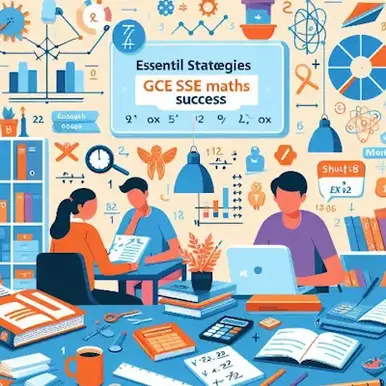The GCSE maths exams are a significant milestone for students in Watford. They can feel daunting, but with the right preparation and strategies, you can approach them with confidence and achieve your best possible results. At RG Maths, we've helped countless students in the area navigate these exams successfully. Here are some essential strategies and tips to guide your preparation:
1. Master the Syllabus: Know What to Expect
- Understand the Content: Familiarize yourself thoroughly with the GCSE maths syllabus for your chosen exam board (Edexcel, AQA, OCR). Know the topics covered in each tier (Foundation and Higher) and identify any areas where you feel less confident.
- Exam Structure: Understand the format of the exams. How many papers are there? What is the duration of each paper? Are they calculator or non-calculator? Knowing the structure will help you plan your revision effectively.
2. Consistent Practice is Key: Work Smarter, Not Just Harder
- Past Papers are Your Best Friend: The most effective way to prepare is by working through past papers from your specific exam board. This helps you understand the question styles, the level of difficulty, and how to allocate your time during the actual exam.
- Regular Practice: Don't cram! Dedicate regular time slots to maths practice throughout your revision period. Even short, focused sessions are more beneficial than infrequent, long ones.
- Identify Your Weak Areas: As you practice, pinpoint the topics you consistently struggle with. Dedicate extra time and effort to these areas. Consider seeking help from your teacher or a tutor at RG Maths for personalized support.
3. Effective Revision Techniques: Beyond Just Reading Notes
- Active Recall: Instead of passively rereading notes, try to recall information without looking. Test yourself with flashcards, practice questions, or by explaining concepts to someone else.
- Spaced Repetition: Review topics at increasing intervals. This helps to solidify information in your long-term memory. There are various apps and tools that can assist with spaced repetition.
- Mind Maps and Concept Mapping: Visually organizing mathematical concepts and their relationships can aid understanding and recall.
- Create Concise Notes: Summarize key formulas, rules, and methods in your own words. These notes will be invaluable for quick revision closer to the exams.
4. Exam Day Strategies: Performing Under Pressure
- Read Questions Carefully: Before attempting to answer, read each question thoroughly to ensure you understand exactly what is being asked. Pay attention to keywords and instructions.
- Show Your Working Clearly: Even if you don't get the final answer correct, showing your working can earn you partial credit. Present your steps logically and neatly.
- Time Management: Allocate your time wisely across all questions. Don't spend too long on a question you're stuck on. Move on and come back to it if you have time at the end.
- Calculator Skills (for Calculator Papers): Be proficient in using your calculator. Know how to perform various functions efficiently. Practice calculator-based questions from past papers.
- Check Your Answers: If time permits, review your answers, especially for calculation errors.
5. Seek Support When Needed: You Don't Have to Do It Alone
- Talk to Your Teacher: Don't hesitate to ask your maths teacher for clarification on topics you find challenging. They are there to help you.
- Consider Tutoring: If you feel you need extra support and personalized guidance, consider GCSE maths tutoring in Watford. At RG Maths, our experienced tutors provide tailored lessons to address your specific needs and help you build confidence.
- Collaborate with Classmates (Wisely): Discussing concepts and working through problems with classmates can be beneficial, but ensure it remains a focused study session.
6. Take Care of Yourself: Your Well-being Matters
- Get Enough Sleep: Adequate rest is crucial for concentration and memory retention. Aim for a consistent sleep schedule, especially in the days leading up to the exams.
- Eat Healthily: Nourish your body with balanced meals to maintain energy levels and focus.
- Stay Hydrated: Drink plenty of water. Dehydration can impair cognitive function.
- Take Breaks: Regular short breaks during study sessions can improve focus and prevent burnout.
- Manage Stress: Find healthy ways to manage stress, such as exercise, mindfulness, or spending time on enjoyable activities.
Your GCSE maths exams are an opportunity to demonstrate your understanding and skills. By implementing these essential strategies and seeking support when needed, students in Watford can prepare effectively, approach the exams with confidence, and achieve their best possible results. Good luck!
